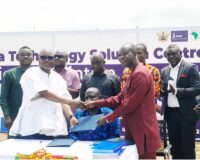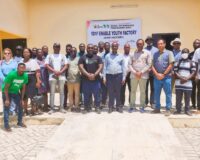In the heart of Ghana, what began as a detour from a poultry farming course has blossomed into a groundbreaking agricultural enterprise. Ebenmmes Fungi Farming Ltd, co-founded by Sedem Amoako and Ebenezer Arku, is now one of the leading mushroom production companies in the Volta Region. Their journey is one of passion, innovation, and social inclusion, demonstrating how rural entrepreneurship, when nurtured, can transform entire communities.
The Accidental Discovery That Sparked a Vision
In 2017, Sedem Amoako, then working as a clerk, took time off to care for her ailing mother in the village. During this period of reflection and service, she found herself drawn to agriculture. Seeking formal training, she enrolled in a poultry farming course offered by the Rural Enterprises Programme (REP) in Kumasi. But it was a chance observation during the training that changed her life.
“During breaks, I noticed some people pouring sawdust into polythene bags. I was curious and found out they were training in mushroom farming. I was immediately fascinated,” Sedem recalls.
Though officially in the poultry class, Sedem began informally joining the mushroom training sessions whenever she could. She skipped siestas to learn more, watching attentively and asking questions.
“That was when I truly discovered what I loved. The recycling, the science, the simplicity—it all made sense to me,” she says.
Building Something from Nothing
After completing her one-month training, Sedem returned to Ho and attempted to apply her new skills with a group of friends. Unfortunately, the results were underwhelming. It wasn’t until December of the same year that she reconnected with a small-scale mushroom farmer, Ebenezer Arku. Inspired by his practical experience and shared vision, they decided to join forces.
In January 2018, Ebenmmes Fungi Farming Ltd was born. With just 500 starter bags and a shared dream, the two began producing mushrooms on a modest scale. Their complementary skills soon proved to be a key strength: Sedem focused on production and management, while Ebenezer handled engineering and equipment fabrication.
Scaling Up Sustainably
Today, Ebenmmes Fungi Farming Ltd produces over 82,000 mushroom bags every quarter. Their operation has expanded from its initial facility in Peki (South Dayi District, Volta Region) to a three-acre site equipped with customized production units and composting facilities.
Their secret to success? A commitment to quality, sustainability, and community development. The duo recycles agricultural by-products such as sawdust, uses organic growing methods, and ensures hygienic packaging of their mushrooms.
“We believe in circular economy principles. Nothing should go to waste,” Sedem explains.
Beyond Business: Social Impact and Empowerment
What makes Ebenmmes exceptional is not just its scale but its mission. The company actively trains and employs rural women and youth, offering them an entry into agribusiness. They have also developed a unique model to support mental health patients, providing training and a sense of purpose as part of their reintegration into society.
“We are not just growing mushrooms; we’re growing people too,” Sedem proudly says.
Through partnerships with local hospitals and support organizations, Ebenmmes is helping redefine social responsibility in rural entrepreneurship.
Innovation through Partnership
One of the company’s strongest advantages is its ability to innovate in-house. Ebenezer, the co-founder, is a skilled fabricator and engineer. He designs and builds the machinery and accessories used in production—from sterilizers to bag fillers and dryers—tailored to their exact needs. This has reduced their operational costs and enabled them to scale more efficiently.
They have also adopted smart agriculture practices, including moisture control systems and data-driven harvest planning, which ensure high yields with minimal environmental impact.
Challenges on the Growth Path
Despite their progress, Ebenmmes Fungi Farming Ltd faces critical challenges. Access to affordable financing remains a major hurdle. The demand for their products far exceeds their current capacity, yet upscaling requires significant capital.
“We need targeted funding and infrastructure support to meet our potential. We can do so much more with the right investment,” Sedem urges.
Energy and water supply remain unreliable, affecting production cycles. Sedem and her team are exploring renewable energy alternatives and water harvesting systems to build resilience.
Looking Ahead: Diversification and Expansion
The future is bright for Ebenmmes. Sedem and Ebenezer are diversifying into poultry and vegetable farming to complement their mushroom production. The goal is to create an integrated agricultural ecosystem that maximizes resource use and boosts food security.
“We want to become a full-fledged agro-processing hub,” Sedem envisions.
Plans are underway to establish a mushroom spawn lab, launch packaged mushroom snacks, and expand distribution to urban supermarkets. They are also exploring export opportunities in neighboring countries.
A Message to Aspiring Entrepreneurs
Sedem’s advice to young entrepreneurs is simple but profound:
“Start small but think big. Don’t be afraid to follow your curiosity—even if it takes you off the beaten path. With dedication and the right support, you can build something extraordinary.”
Conclusion: Cultivating More Than Mushrooms
Ebenmmes Fungi Farming Ltd is not just a mushroom company. It is a beacon of hope, a center for innovation, and a catalyst for inclusive growth. Sedem and Ebenezer’s story illustrates how the Rural Enterprises Programme can unleash the potential of individuals to change their communities.
Their farm stands as a living example of how sustainable agriculture can address social, economic, and environmental challenges. As Sedem puts it:
“We’re proud of what we’ve built. It’s not just about profits; it’s about purpose.”
- Enterprise: Ebenmmes Fungi Farming Ltd
- Founders: Sedem Amoako & Ebenezer Arku
- Location: Peki, South Dayi District, Volta Region




